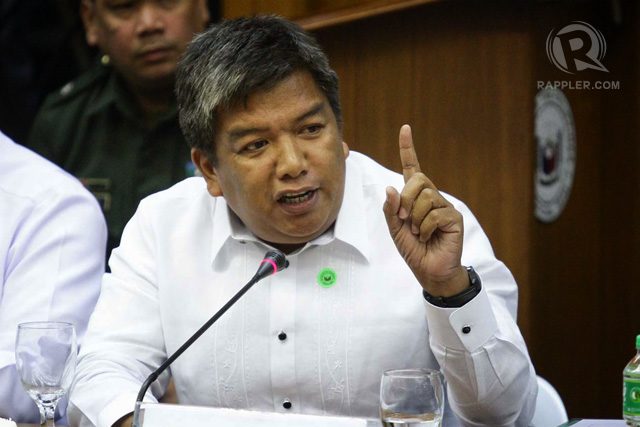SUMMARY
This is AI generated summarization, which may have errors. For context, always refer to the full article.

MANILA, Philippines – Governor Mujiv Hataman said on Thursday, October 8, that regardless of its flaws, the proposed Bangsamoro Basic Law (BBL) is still “far better” than the current structure of the Autonomous Region in Muslim Mindanao (ARMM).
“Maybe the BBL is not the perfect one but for now, we have no other alternative,” he said during a forum organized by the Eisenhower Fellowship Association in the Philippines (EFAP).
The controversial bill, he explained, will seek to address the existing problems within the government structure in the region. These problems include strain in intergovernmental relations and lack of power on the part of the regional government, among others. (READ: How different is ARMM from the Bangsamoro?)
“These create more problems and complicate everything,” Hataman said. “It’s really very problematic and exhausting that’s why I fully support the BBL because most of these areas aren’t addressed by the ARMM.”
Failure in translating to LGUs
The proposed BBL is a product of negotiations spanning decades between the government and the Moro Islamic Liberation Front (MILF).
Seen by some as unconstitutional and impractical – most especially following the clash between rebels and elite policemen – the bill remained in limbo until recently when both chambers of Congress set December 16 as the new deadline. However, members of the two peace panels want it passed before the Asia Pacific Economic Conference (APEC) in November. (READ: Pass Bangsamoro Basic Law before APEC, Not Decemuber)
Hataman said the BBL is the answer to what the ARMM failed to address – including the failure of bringing change down to the local government level.
“We were able to fix and transform the ARMM as we deliver our mandate to our constituents,” Hataman said. “It’s unfortunate but we’re not able to translate to the local government units.”
Several LGUs in the region failed to function and provide good governance, since ARMM didn’t have the power to police them.
“We don’t have control over them,” Hataman said. “We cannot do special audit or even prosecute them.”
Hataman said the budget system of the BBL is also a welcome change because under this set-up they would no longer need to “beg” from legislators regarding funding.
Under the current structure, the budget of ARMM is still dependent on the national government and has to be justified.
The BBL, once implemented, will introduce the concept of an annual block grant which is taken from the national government’s total revenue collection share.
“We [won’t have] to go to Congress and beg for funds,” he said. “We will automatically get something depending on what will be set in the law.”
The budget in the region thus can be utilized for projects that can benefit the residents.
“There are different programs that are lodged under the national government and not under us,” Hataman said. “All our program funds are under the central office of the different agencies.
Ready for the future
Amid delays and issues, Hataman said ARMM is “not a hopeless case” because it has shown in recent years that development can work in the region. (READ: From Marcos to Aquino: The cost of war)
“We have proven that the ARMM is a region where development is possible, where the government can truly serve the people,” he said. “This is now a place where everyone can live together in harmony as they help each other in achieving peace.”
“The hope we place in the future is slowly but surely taking root,” the Eisenhower Fellow said. “We have provided stability we once only dreamed of.” – Rappler.com
Add a comment
How does this make you feel?
There are no comments yet. Add your comment to start the conversation.